Strategic Management in NGOs: Systematic Literature Review Report
VerifiedAdded on 2023/06/15
|15
|3199
|155
Literature Review
AI Summary
This paper presents a systematic literature review on strategic management in Non-Governmental Organizations (NGOs), exploring the growing importance of these organizations and the management challenges they face. It examines the relationship between NGOs and their donors, as well as their interactions with governments, highlighting the need for coordination and accountability. The review covers articles available on Google Scholar post-2012, focusing on the strategic impact of NGOs and the problems associated with their management. The paper aims to evaluate the available information on the significance of strategic management in NGOs and the factors contributing to their growth, addressing key questions about the challenges, effects, and the link between performance and strategic management within these organizations. Desklib is a platform where students can find this and other helpful resources.

Running head: PROFESSIONAL PROJECT
Professional project
Name of the student:
Name of the University:
Author note:
Professional project
Name of the student:
Name of the University:
Author note:
Paraphrase This Document
Need a fresh take? Get an instant paraphrase of this document with our AI Paraphraser
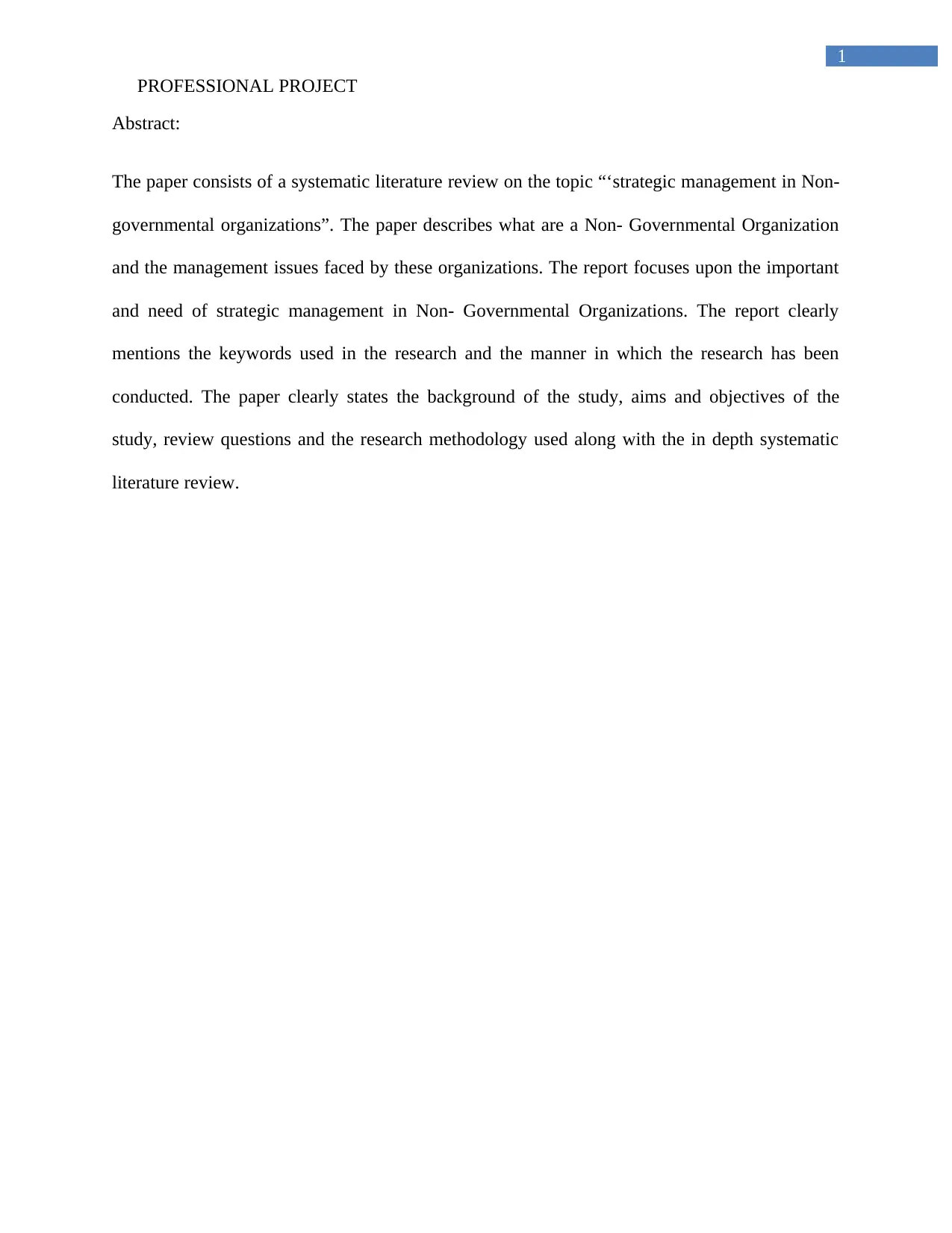
1
PROFESSIONAL PROJECT
Abstract:
The paper consists of a systematic literature review on the topic “‘strategic management in Non-
governmental organizations”. The paper describes what are a Non- Governmental Organization
and the management issues faced by these organizations. The report focuses upon the important
and need of strategic management in Non- Governmental Organizations. The report clearly
mentions the keywords used in the research and the manner in which the research has been
conducted. The paper clearly states the background of the study, aims and objectives of the
study, review questions and the research methodology used along with the in depth systematic
literature review.
PROFESSIONAL PROJECT
Abstract:
The paper consists of a systematic literature review on the topic “‘strategic management in Non-
governmental organizations”. The paper describes what are a Non- Governmental Organization
and the management issues faced by these organizations. The report focuses upon the important
and need of strategic management in Non- Governmental Organizations. The report clearly
mentions the keywords used in the research and the manner in which the research has been
conducted. The paper clearly states the background of the study, aims and objectives of the
study, review questions and the research methodology used along with the in depth systematic
literature review.
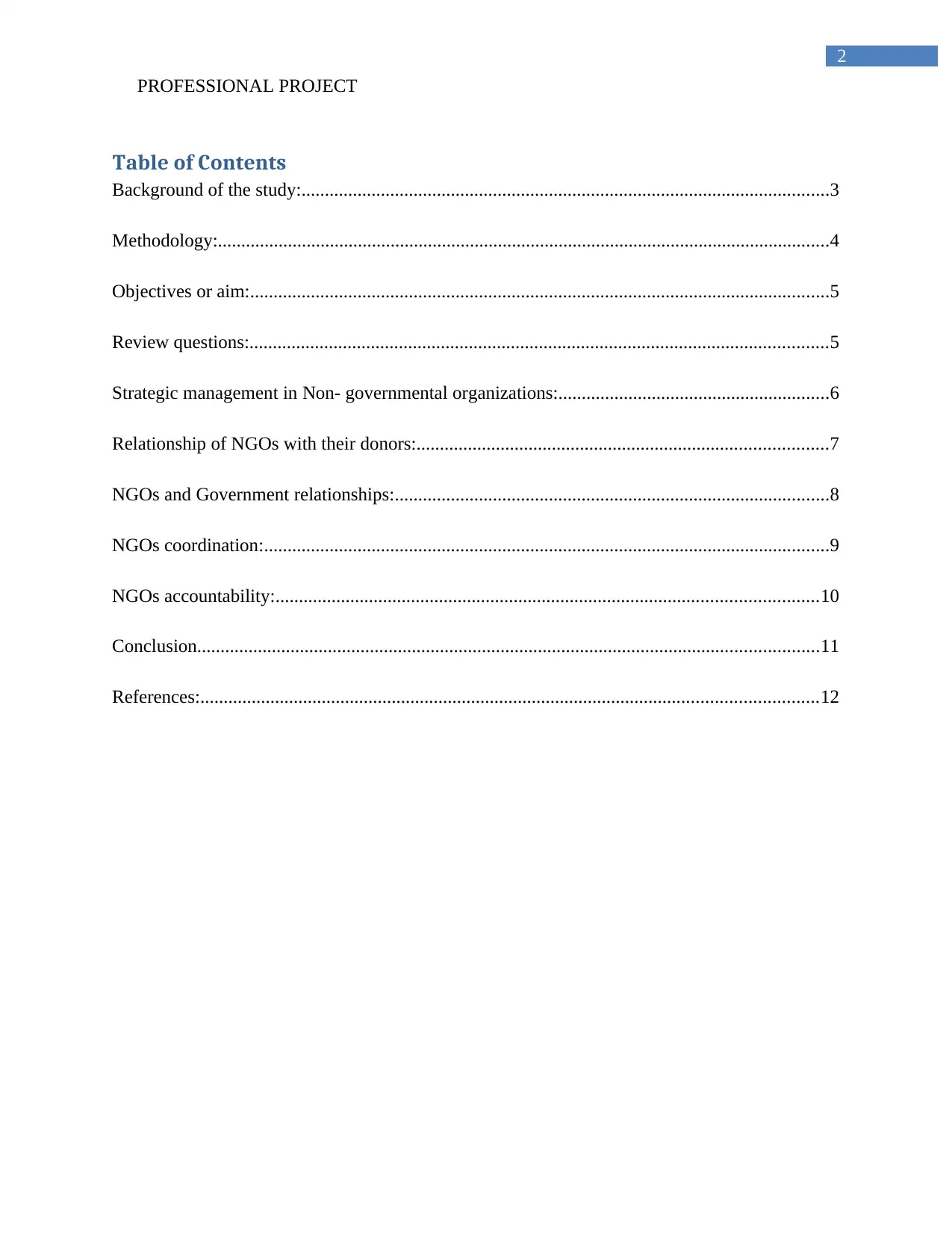
2
PROFESSIONAL PROJECT
Table of Contents
Background of the study:.................................................................................................................3
Methodology:...................................................................................................................................4
Objectives or aim:............................................................................................................................5
Review questions:............................................................................................................................5
Strategic management in Non- governmental organizations:..........................................................6
Relationship of NGOs with their donors:........................................................................................7
NGOs and Government relationships:.............................................................................................8
NGOs coordination:.........................................................................................................................9
NGOs accountability:....................................................................................................................10
Conclusion.....................................................................................................................................11
References:....................................................................................................................................12
PROFESSIONAL PROJECT
Table of Contents
Background of the study:.................................................................................................................3
Methodology:...................................................................................................................................4
Objectives or aim:............................................................................................................................5
Review questions:............................................................................................................................5
Strategic management in Non- governmental organizations:..........................................................6
Relationship of NGOs with their donors:........................................................................................7
NGOs and Government relationships:.............................................................................................8
NGOs coordination:.........................................................................................................................9
NGOs accountability:....................................................................................................................10
Conclusion.....................................................................................................................................11
References:....................................................................................................................................12
⊘ This is a preview!⊘
Do you want full access?
Subscribe today to unlock all pages.

Trusted by 1+ million students worldwide
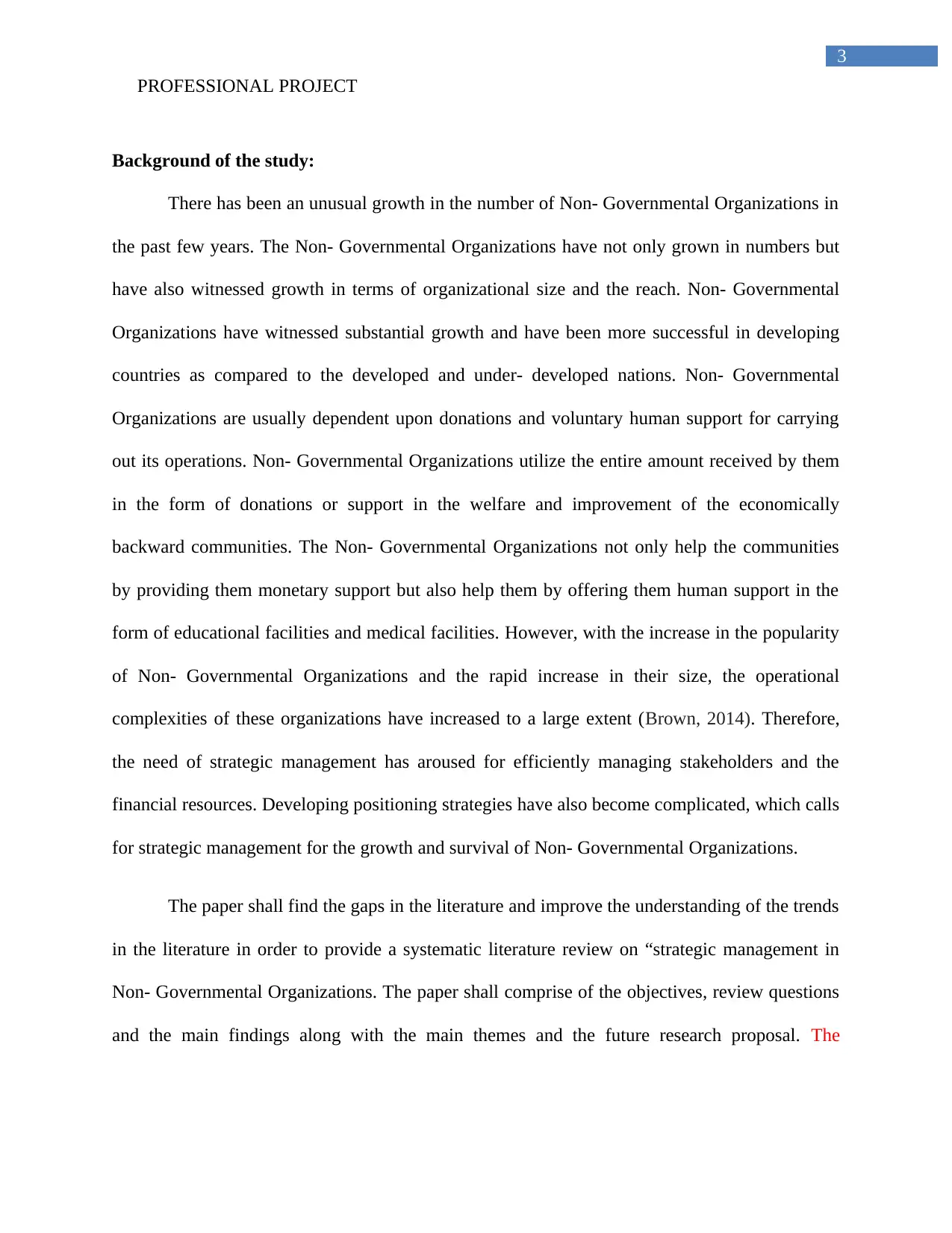
3
PROFESSIONAL PROJECT
Background of the study:
There has been an unusual growth in the number of Non- Governmental Organizations in
the past few years. The Non- Governmental Organizations have not only grown in numbers but
have also witnessed growth in terms of organizational size and the reach. Non- Governmental
Organizations have witnessed substantial growth and have been more successful in developing
countries as compared to the developed and under- developed nations. Non- Governmental
Organizations are usually dependent upon donations and voluntary human support for carrying
out its operations. Non- Governmental Organizations utilize the entire amount received by them
in the form of donations or support in the welfare and improvement of the economically
backward communities. The Non- Governmental Organizations not only help the communities
by providing them monetary support but also help them by offering them human support in the
form of educational facilities and medical facilities. However, with the increase in the popularity
of Non- Governmental Organizations and the rapid increase in their size, the operational
complexities of these organizations have increased to a large extent (Brown, 2014). Therefore,
the need of strategic management has aroused for efficiently managing stakeholders and the
financial resources. Developing positioning strategies have also become complicated, which calls
for strategic management for the growth and survival of Non- Governmental Organizations.
The paper shall find the gaps in the literature and improve the understanding of the trends
in the literature in order to provide a systematic literature review on “strategic management in
Non- Governmental Organizations. The paper shall comprise of the objectives, review questions
and the main findings along with the main themes and the future research proposal. The
PROFESSIONAL PROJECT
Background of the study:
There has been an unusual growth in the number of Non- Governmental Organizations in
the past few years. The Non- Governmental Organizations have not only grown in numbers but
have also witnessed growth in terms of organizational size and the reach. Non- Governmental
Organizations have witnessed substantial growth and have been more successful in developing
countries as compared to the developed and under- developed nations. Non- Governmental
Organizations are usually dependent upon donations and voluntary human support for carrying
out its operations. Non- Governmental Organizations utilize the entire amount received by them
in the form of donations or support in the welfare and improvement of the economically
backward communities. The Non- Governmental Organizations not only help the communities
by providing them monetary support but also help them by offering them human support in the
form of educational facilities and medical facilities. However, with the increase in the popularity
of Non- Governmental Organizations and the rapid increase in their size, the operational
complexities of these organizations have increased to a large extent (Brown, 2014). Therefore,
the need of strategic management has aroused for efficiently managing stakeholders and the
financial resources. Developing positioning strategies have also become complicated, which calls
for strategic management for the growth and survival of Non- Governmental Organizations.
The paper shall find the gaps in the literature and improve the understanding of the trends
in the literature in order to provide a systematic literature review on “strategic management in
Non- Governmental Organizations. The paper shall comprise of the objectives, review questions
and the main findings along with the main themes and the future research proposal. The
Paraphrase This Document
Need a fresh take? Get an instant paraphrase of this document with our AI Paraphraser
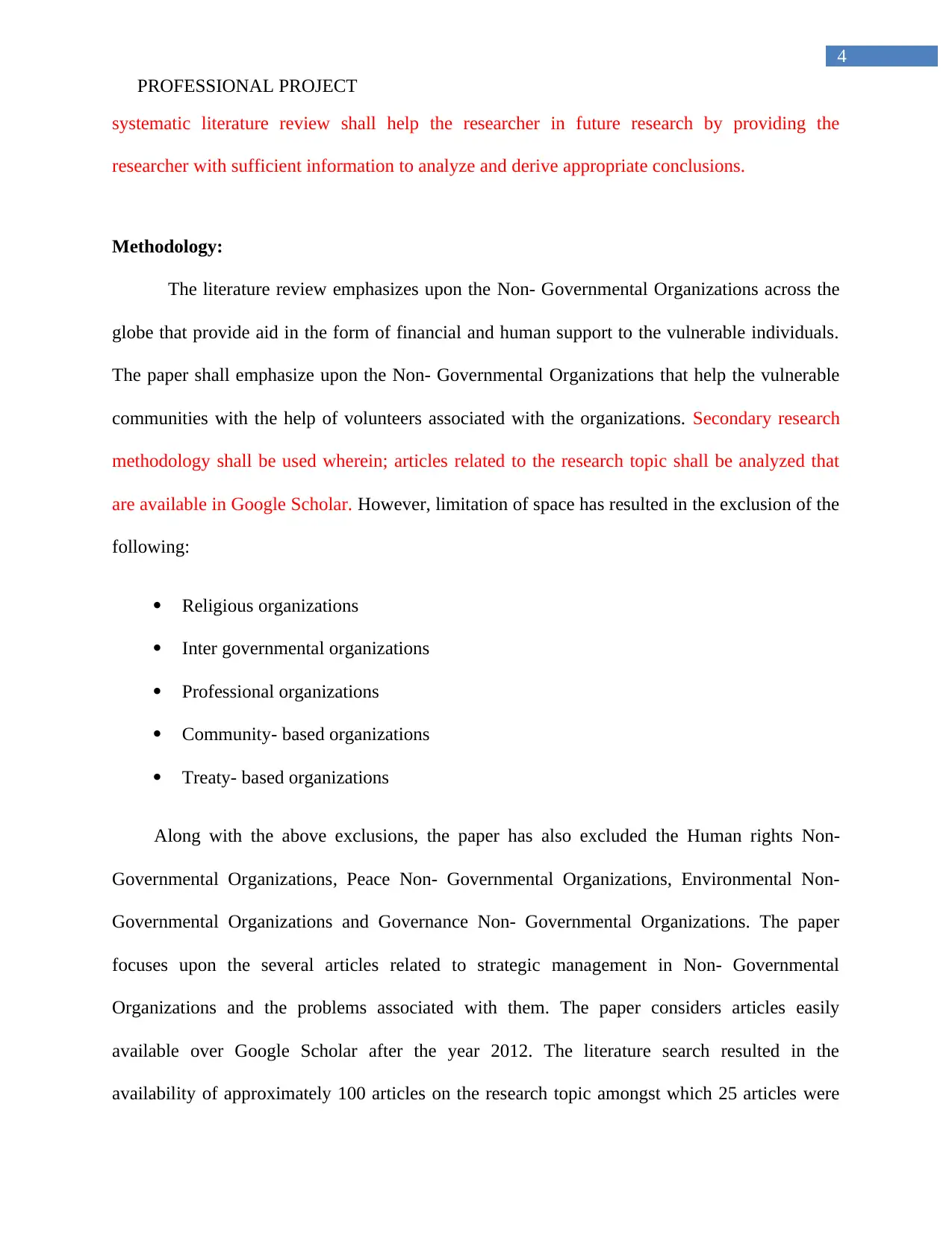
4
PROFESSIONAL PROJECT
systematic literature review shall help the researcher in future research by providing the
researcher with sufficient information to analyze and derive appropriate conclusions.
Methodology:
The literature review emphasizes upon the Non- Governmental Organizations across the
globe that provide aid in the form of financial and human support to the vulnerable individuals.
The paper shall emphasize upon the Non- Governmental Organizations that help the vulnerable
communities with the help of volunteers associated with the organizations. Secondary research
methodology shall be used wherein; articles related to the research topic shall be analyzed that
are available in Google Scholar. However, limitation of space has resulted in the exclusion of the
following:
Religious organizations
Inter governmental organizations
Professional organizations
Community- based organizations
Treaty- based organizations
Along with the above exclusions, the paper has also excluded the Human rights Non-
Governmental Organizations, Peace Non- Governmental Organizations, Environmental Non-
Governmental Organizations and Governance Non- Governmental Organizations. The paper
focuses upon the several articles related to strategic management in Non- Governmental
Organizations and the problems associated with them. The paper considers articles easily
available over Google Scholar after the year 2012. The literature search resulted in the
availability of approximately 100 articles on the research topic amongst which 25 articles were
PROFESSIONAL PROJECT
systematic literature review shall help the researcher in future research by providing the
researcher with sufficient information to analyze and derive appropriate conclusions.
Methodology:
The literature review emphasizes upon the Non- Governmental Organizations across the
globe that provide aid in the form of financial and human support to the vulnerable individuals.
The paper shall emphasize upon the Non- Governmental Organizations that help the vulnerable
communities with the help of volunteers associated with the organizations. Secondary research
methodology shall be used wherein; articles related to the research topic shall be analyzed that
are available in Google Scholar. However, limitation of space has resulted in the exclusion of the
following:
Religious organizations
Inter governmental organizations
Professional organizations
Community- based organizations
Treaty- based organizations
Along with the above exclusions, the paper has also excluded the Human rights Non-
Governmental Organizations, Peace Non- Governmental Organizations, Environmental Non-
Governmental Organizations and Governance Non- Governmental Organizations. The paper
focuses upon the several articles related to strategic management in Non- Governmental
Organizations and the problems associated with them. The paper considers articles easily
available over Google Scholar after the year 2012. The literature search resulted in the
availability of approximately 100 articles on the research topic amongst which 25 articles were
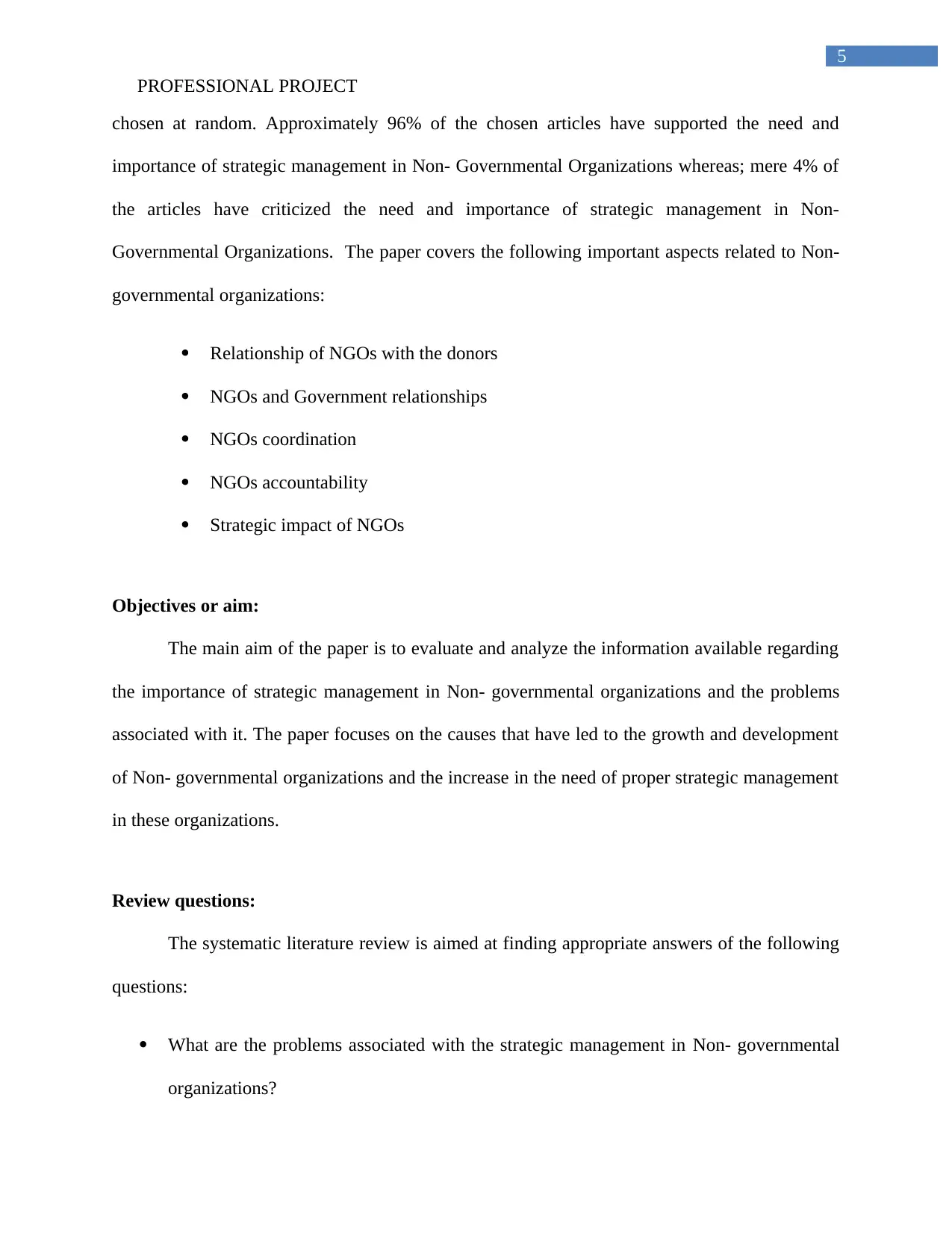
5
PROFESSIONAL PROJECT
chosen at random. Approximately 96% of the chosen articles have supported the need and
importance of strategic management in Non- Governmental Organizations whereas; mere 4% of
the articles have criticized the need and importance of strategic management in Non-
Governmental Organizations. The paper covers the following important aspects related to Non-
governmental organizations:
Relationship of NGOs with the donors
NGOs and Government relationships
NGOs coordination
NGOs accountability
Strategic impact of NGOs
Objectives or aim:
The main aim of the paper is to evaluate and analyze the information available regarding
the importance of strategic management in Non- governmental organizations and the problems
associated with it. The paper focuses on the causes that have led to the growth and development
of Non- governmental organizations and the increase in the need of proper strategic management
in these organizations.
Review questions:
The systematic literature review is aimed at finding appropriate answers of the following
questions:
What are the problems associated with the strategic management in Non- governmental
organizations?
PROFESSIONAL PROJECT
chosen at random. Approximately 96% of the chosen articles have supported the need and
importance of strategic management in Non- Governmental Organizations whereas; mere 4% of
the articles have criticized the need and importance of strategic management in Non-
Governmental Organizations. The paper covers the following important aspects related to Non-
governmental organizations:
Relationship of NGOs with the donors
NGOs and Government relationships
NGOs coordination
NGOs accountability
Strategic impact of NGOs
Objectives or aim:
The main aim of the paper is to evaluate and analyze the information available regarding
the importance of strategic management in Non- governmental organizations and the problems
associated with it. The paper focuses on the causes that have led to the growth and development
of Non- governmental organizations and the increase in the need of proper strategic management
in these organizations.
Review questions:
The systematic literature review is aimed at finding appropriate answers of the following
questions:
What are the problems associated with the strategic management in Non- governmental
organizations?
⊘ This is a preview!⊘
Do you want full access?
Subscribe today to unlock all pages.

Trusted by 1+ million students worldwide
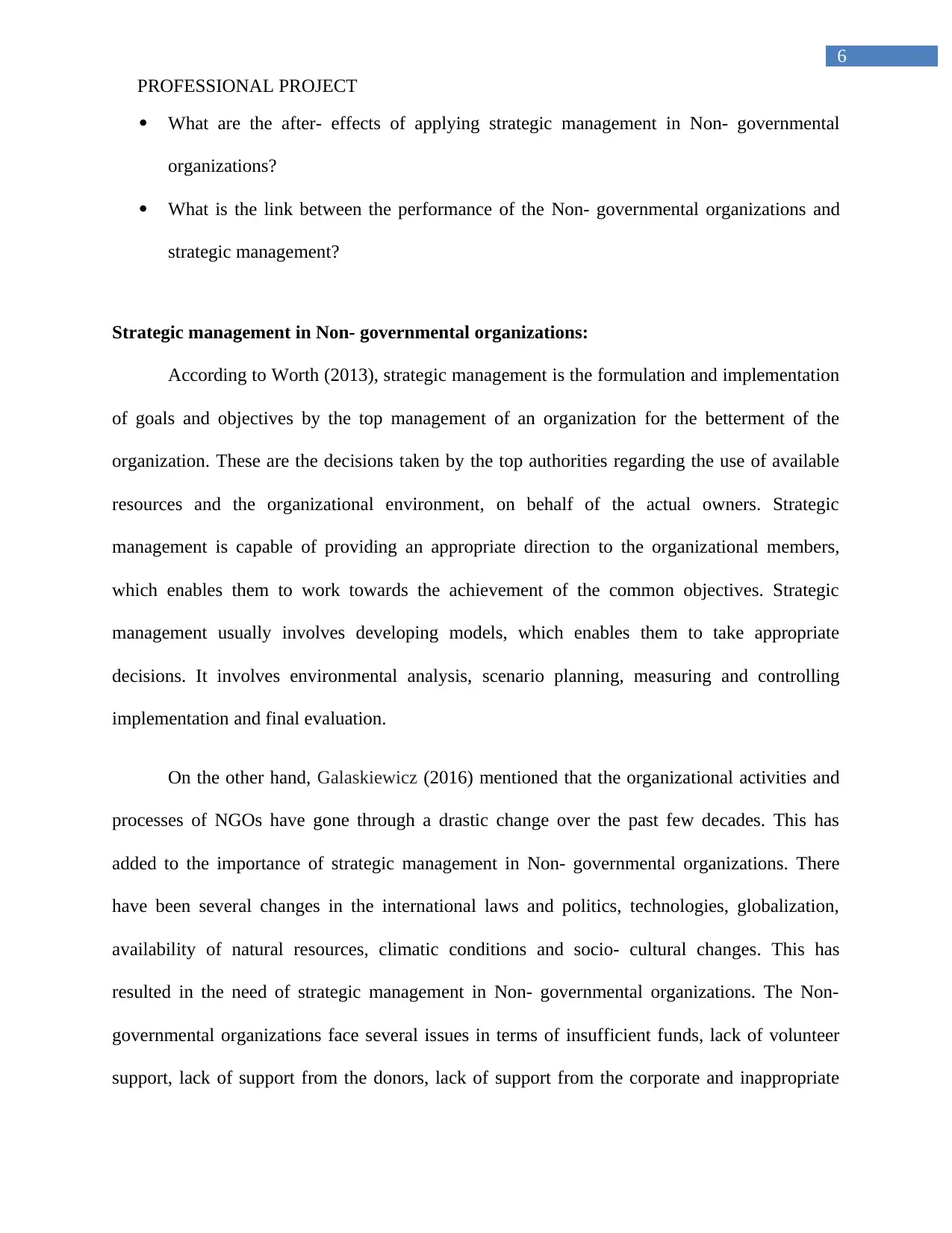
6
PROFESSIONAL PROJECT
What are the after- effects of applying strategic management in Non- governmental
organizations?
What is the link between the performance of the Non- governmental organizations and
strategic management?
Strategic management in Non- governmental organizations:
According to Worth (2013), strategic management is the formulation and implementation
of goals and objectives by the top management of an organization for the betterment of the
organization. These are the decisions taken by the top authorities regarding the use of available
resources and the organizational environment, on behalf of the actual owners. Strategic
management is capable of providing an appropriate direction to the organizational members,
which enables them to work towards the achievement of the common objectives. Strategic
management usually involves developing models, which enables them to take appropriate
decisions. It involves environmental analysis, scenario planning, measuring and controlling
implementation and final evaluation.
On the other hand, Galaskiewicz (2016) mentioned that the organizational activities and
processes of NGOs have gone through a drastic change over the past few decades. This has
added to the importance of strategic management in Non- governmental organizations. There
have been several changes in the international laws and politics, technologies, globalization,
availability of natural resources, climatic conditions and socio- cultural changes. This has
resulted in the need of strategic management in Non- governmental organizations. The Non-
governmental organizations face several issues in terms of insufficient funds, lack of volunteer
support, lack of support from the donors, lack of support from the corporate and inappropriate
PROFESSIONAL PROJECT
What are the after- effects of applying strategic management in Non- governmental
organizations?
What is the link between the performance of the Non- governmental organizations and
strategic management?
Strategic management in Non- governmental organizations:
According to Worth (2013), strategic management is the formulation and implementation
of goals and objectives by the top management of an organization for the betterment of the
organization. These are the decisions taken by the top authorities regarding the use of available
resources and the organizational environment, on behalf of the actual owners. Strategic
management is capable of providing an appropriate direction to the organizational members,
which enables them to work towards the achievement of the common objectives. Strategic
management usually involves developing models, which enables them to take appropriate
decisions. It involves environmental analysis, scenario planning, measuring and controlling
implementation and final evaluation.
On the other hand, Galaskiewicz (2016) mentioned that the organizational activities and
processes of NGOs have gone through a drastic change over the past few decades. This has
added to the importance of strategic management in Non- governmental organizations. There
have been several changes in the international laws and politics, technologies, globalization,
availability of natural resources, climatic conditions and socio- cultural changes. This has
resulted in the need of strategic management in Non- governmental organizations. The Non-
governmental organizations face several issues in terms of insufficient funds, lack of volunteer
support, lack of support from the donors, lack of support from the corporate and inappropriate
Paraphrase This Document
Need a fresh take? Get an instant paraphrase of this document with our AI Paraphraser
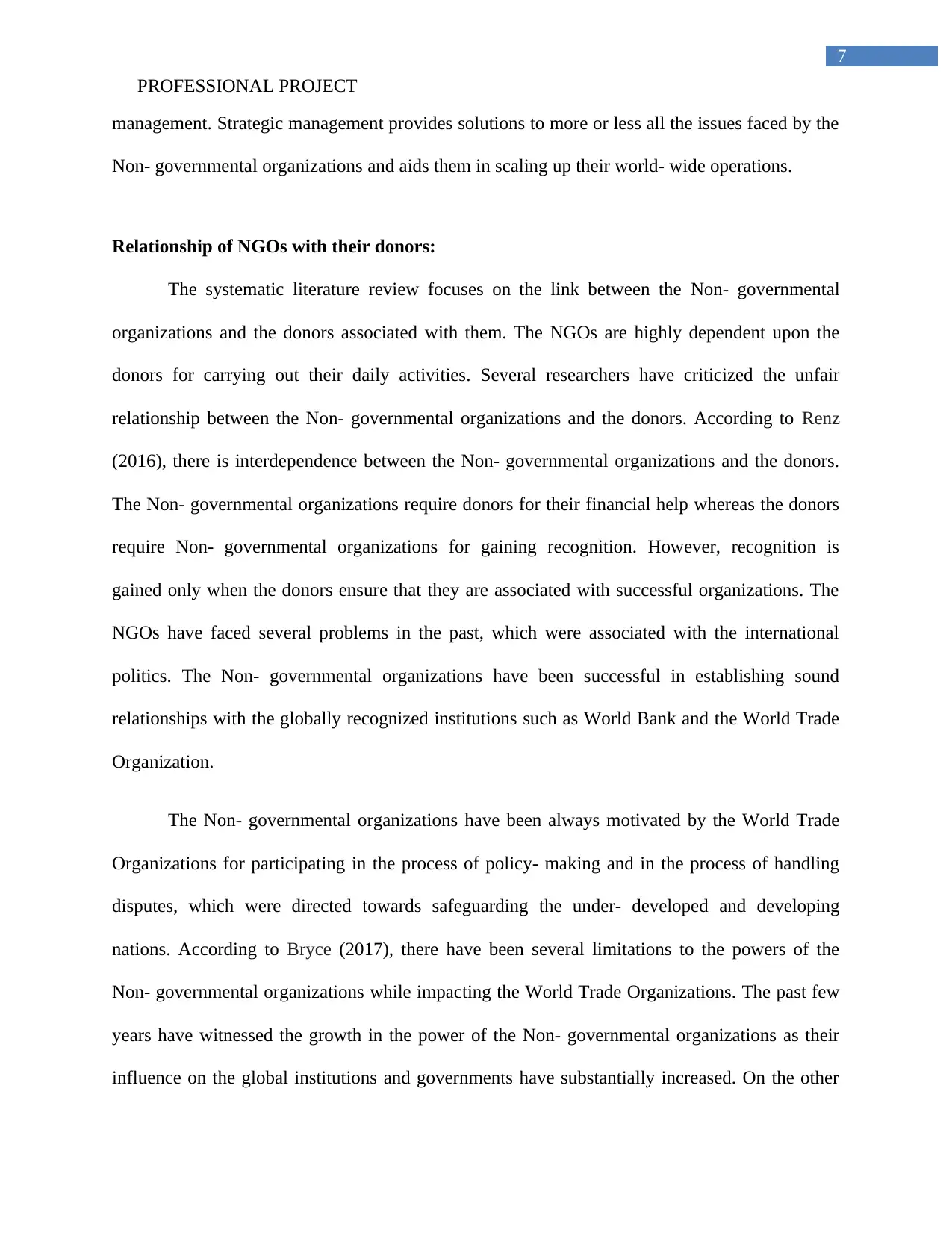
7
PROFESSIONAL PROJECT
management. Strategic management provides solutions to more or less all the issues faced by the
Non- governmental organizations and aids them in scaling up their world- wide operations.
Relationship of NGOs with their donors:
The systematic literature review focuses on the link between the Non- governmental
organizations and the donors associated with them. The NGOs are highly dependent upon the
donors for carrying out their daily activities. Several researchers have criticized the unfair
relationship between the Non- governmental organizations and the donors. According to Renz
(2016), there is interdependence between the Non- governmental organizations and the donors.
The Non- governmental organizations require donors for their financial help whereas the donors
require Non- governmental organizations for gaining recognition. However, recognition is
gained only when the donors ensure that they are associated with successful organizations. The
NGOs have faced several problems in the past, which were associated with the international
politics. The Non- governmental organizations have been successful in establishing sound
relationships with the globally recognized institutions such as World Bank and the World Trade
Organization.
The Non- governmental organizations have been always motivated by the World Trade
Organizations for participating in the process of policy- making and in the process of handling
disputes, which were directed towards safeguarding the under- developed and developing
nations. According to Bryce (2017), there have been several limitations to the powers of the
Non- governmental organizations while impacting the World Trade Organizations. The past few
years have witnessed the growth in the power of the Non- governmental organizations as their
influence on the global institutions and governments have substantially increased. On the other
PROFESSIONAL PROJECT
management. Strategic management provides solutions to more or less all the issues faced by the
Non- governmental organizations and aids them in scaling up their world- wide operations.
Relationship of NGOs with their donors:
The systematic literature review focuses on the link between the Non- governmental
organizations and the donors associated with them. The NGOs are highly dependent upon the
donors for carrying out their daily activities. Several researchers have criticized the unfair
relationship between the Non- governmental organizations and the donors. According to Renz
(2016), there is interdependence between the Non- governmental organizations and the donors.
The Non- governmental organizations require donors for their financial help whereas the donors
require Non- governmental organizations for gaining recognition. However, recognition is
gained only when the donors ensure that they are associated with successful organizations. The
NGOs have faced several problems in the past, which were associated with the international
politics. The Non- governmental organizations have been successful in establishing sound
relationships with the globally recognized institutions such as World Bank and the World Trade
Organization.
The Non- governmental organizations have been always motivated by the World Trade
Organizations for participating in the process of policy- making and in the process of handling
disputes, which were directed towards safeguarding the under- developed and developing
nations. According to Bryce (2017), there have been several limitations to the powers of the
Non- governmental organizations while impacting the World Trade Organizations. The past few
years have witnessed the growth in the power of the Non- governmental organizations as their
influence on the global institutions and governments have substantially increased. On the other
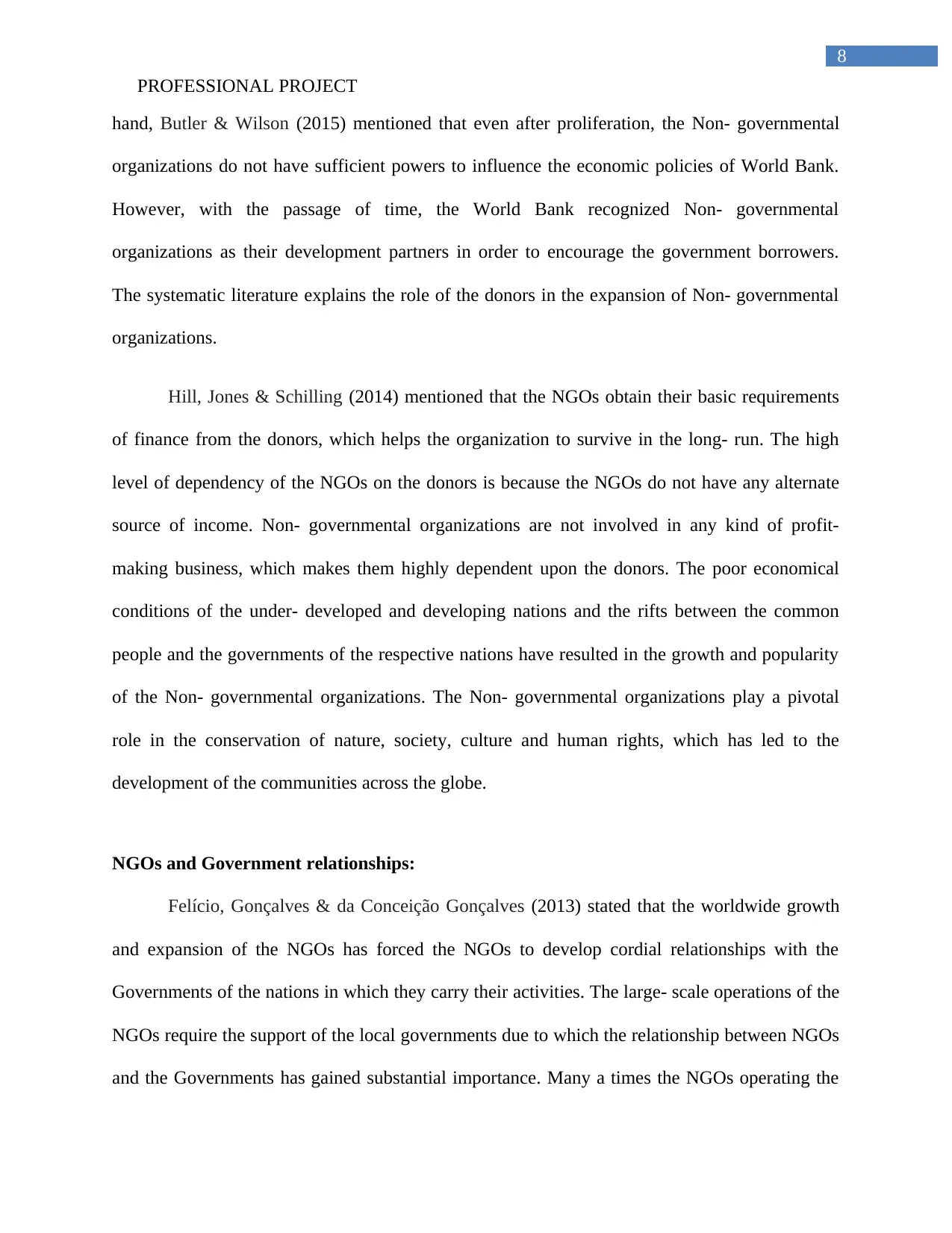
8
PROFESSIONAL PROJECT
hand, Butler & Wilson (2015) mentioned that even after proliferation, the Non- governmental
organizations do not have sufficient powers to influence the economic policies of World Bank.
However, with the passage of time, the World Bank recognized Non- governmental
organizations as their development partners in order to encourage the government borrowers.
The systematic literature explains the role of the donors in the expansion of Non- governmental
organizations.
Hill, Jones & Schilling (2014) mentioned that the NGOs obtain their basic requirements
of finance from the donors, which helps the organization to survive in the long- run. The high
level of dependency of the NGOs on the donors is because the NGOs do not have any alternate
source of income. Non- governmental organizations are not involved in any kind of profit-
making business, which makes them highly dependent upon the donors. The poor economical
conditions of the under- developed and developing nations and the rifts between the common
people and the governments of the respective nations have resulted in the growth and popularity
of the Non- governmental organizations. The Non- governmental organizations play a pivotal
role in the conservation of nature, society, culture and human rights, which has led to the
development of the communities across the globe.
NGOs and Government relationships:
Felício, Gonçalves & da Conceição Gonçalves (2013) stated that the worldwide growth
and expansion of the NGOs has forced the NGOs to develop cordial relationships with the
Governments of the nations in which they carry their activities. The large- scale operations of the
NGOs require the support of the local governments due to which the relationship between NGOs
and the Governments has gained substantial importance. Many a times the NGOs operating the
PROFESSIONAL PROJECT
hand, Butler & Wilson (2015) mentioned that even after proliferation, the Non- governmental
organizations do not have sufficient powers to influence the economic policies of World Bank.
However, with the passage of time, the World Bank recognized Non- governmental
organizations as their development partners in order to encourage the government borrowers.
The systematic literature explains the role of the donors in the expansion of Non- governmental
organizations.
Hill, Jones & Schilling (2014) mentioned that the NGOs obtain their basic requirements
of finance from the donors, which helps the organization to survive in the long- run. The high
level of dependency of the NGOs on the donors is because the NGOs do not have any alternate
source of income. Non- governmental organizations are not involved in any kind of profit-
making business, which makes them highly dependent upon the donors. The poor economical
conditions of the under- developed and developing nations and the rifts between the common
people and the governments of the respective nations have resulted in the growth and popularity
of the Non- governmental organizations. The Non- governmental organizations play a pivotal
role in the conservation of nature, society, culture and human rights, which has led to the
development of the communities across the globe.
NGOs and Government relationships:
Felício, Gonçalves & da Conceição Gonçalves (2013) stated that the worldwide growth
and expansion of the NGOs has forced the NGOs to develop cordial relationships with the
Governments of the nations in which they carry their activities. The large- scale operations of the
NGOs require the support of the local governments due to which the relationship between NGOs
and the Governments has gained substantial importance. Many a times the NGOs operating the
⊘ This is a preview!⊘
Do you want full access?
Subscribe today to unlock all pages.

Trusted by 1+ million students worldwide
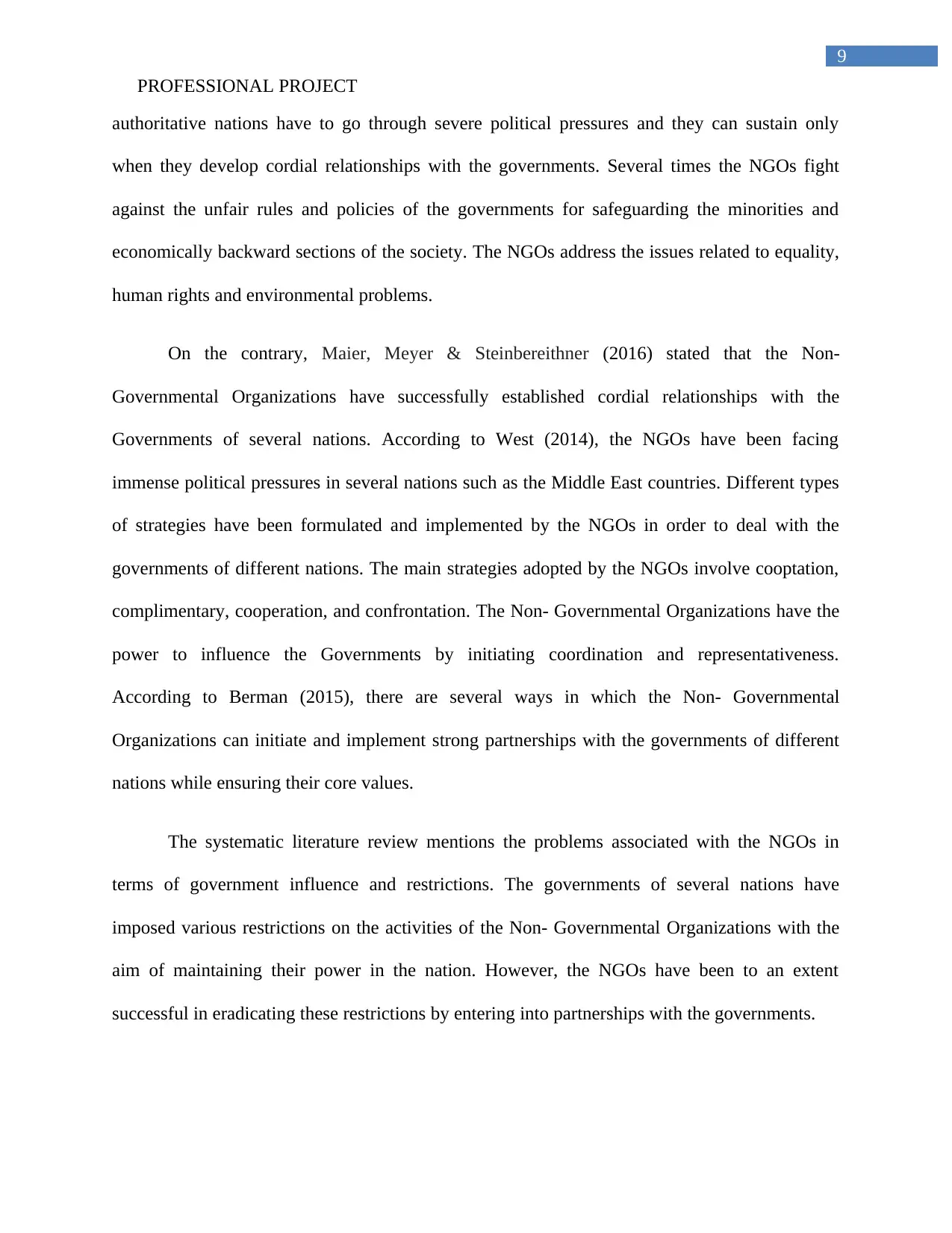
9
PROFESSIONAL PROJECT
authoritative nations have to go through severe political pressures and they can sustain only
when they develop cordial relationships with the governments. Several times the NGOs fight
against the unfair rules and policies of the governments for safeguarding the minorities and
economically backward sections of the society. The NGOs address the issues related to equality,
human rights and environmental problems.
On the contrary, Maier, Meyer & Steinbereithner (2016) stated that the Non-
Governmental Organizations have successfully established cordial relationships with the
Governments of several nations. According to West (2014), the NGOs have been facing
immense political pressures in several nations such as the Middle East countries. Different types
of strategies have been formulated and implemented by the NGOs in order to deal with the
governments of different nations. The main strategies adopted by the NGOs involve cooptation,
complimentary, cooperation, and confrontation. The Non- Governmental Organizations have the
power to influence the Governments by initiating coordination and representativeness.
According to Berman (2015), there are several ways in which the Non- Governmental
Organizations can initiate and implement strong partnerships with the governments of different
nations while ensuring their core values.
The systematic literature review mentions the problems associated with the NGOs in
terms of government influence and restrictions. The governments of several nations have
imposed various restrictions on the activities of the Non- Governmental Organizations with the
aim of maintaining their power in the nation. However, the NGOs have been to an extent
successful in eradicating these restrictions by entering into partnerships with the governments.
PROFESSIONAL PROJECT
authoritative nations have to go through severe political pressures and they can sustain only
when they develop cordial relationships with the governments. Several times the NGOs fight
against the unfair rules and policies of the governments for safeguarding the minorities and
economically backward sections of the society. The NGOs address the issues related to equality,
human rights and environmental problems.
On the contrary, Maier, Meyer & Steinbereithner (2016) stated that the Non-
Governmental Organizations have successfully established cordial relationships with the
Governments of several nations. According to West (2014), the NGOs have been facing
immense political pressures in several nations such as the Middle East countries. Different types
of strategies have been formulated and implemented by the NGOs in order to deal with the
governments of different nations. The main strategies adopted by the NGOs involve cooptation,
complimentary, cooperation, and confrontation. The Non- Governmental Organizations have the
power to influence the Governments by initiating coordination and representativeness.
According to Berman (2015), there are several ways in which the Non- Governmental
Organizations can initiate and implement strong partnerships with the governments of different
nations while ensuring their core values.
The systematic literature review mentions the problems associated with the NGOs in
terms of government influence and restrictions. The governments of several nations have
imposed various restrictions on the activities of the Non- Governmental Organizations with the
aim of maintaining their power in the nation. However, the NGOs have been to an extent
successful in eradicating these restrictions by entering into partnerships with the governments.
Paraphrase This Document
Need a fresh take? Get an instant paraphrase of this document with our AI Paraphraser
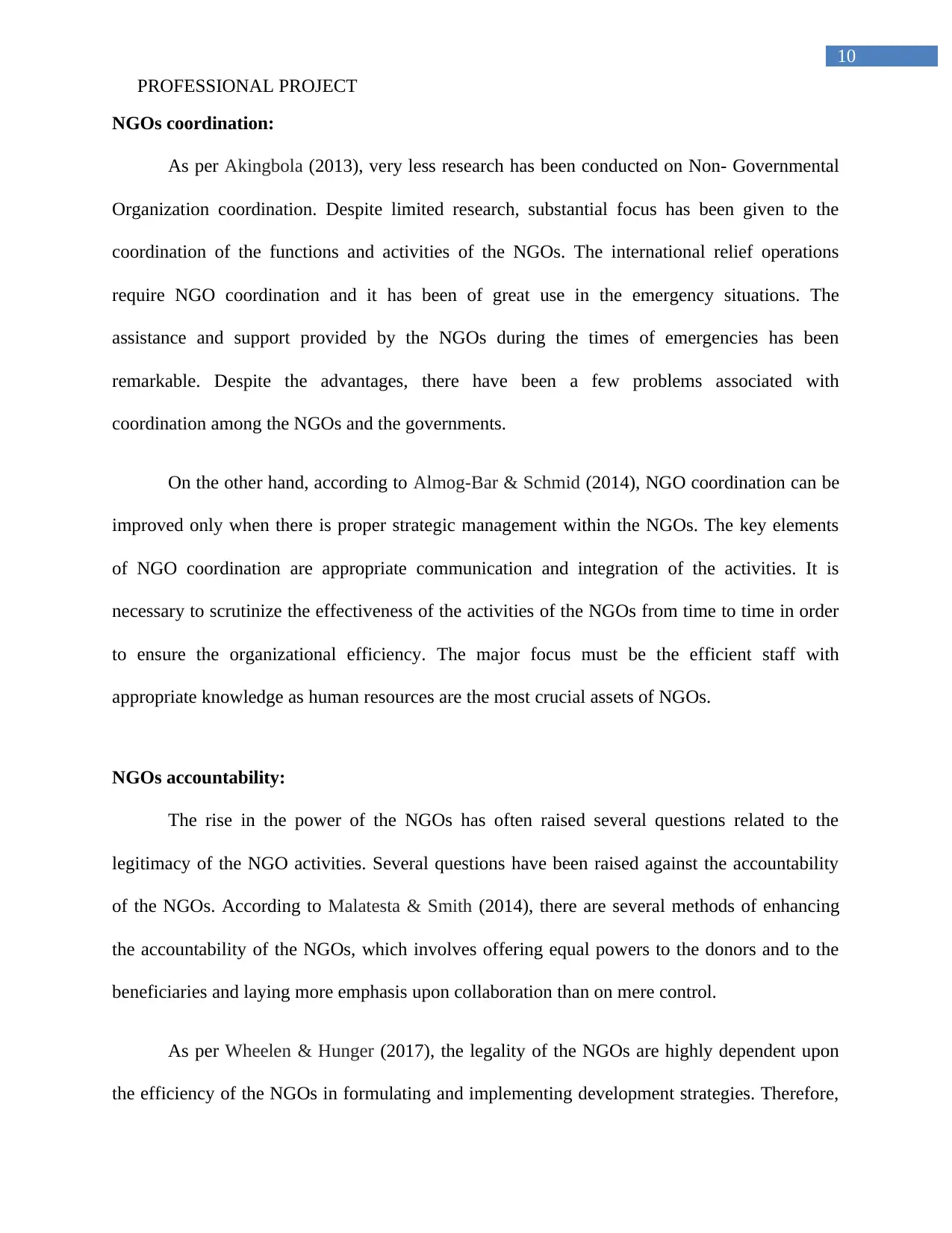
10
PROFESSIONAL PROJECT
NGOs coordination:
As per Akingbola (2013), very less research has been conducted on Non- Governmental
Organization coordination. Despite limited research, substantial focus has been given to the
coordination of the functions and activities of the NGOs. The international relief operations
require NGO coordination and it has been of great use in the emergency situations. The
assistance and support provided by the NGOs during the times of emergencies has been
remarkable. Despite the advantages, there have been a few problems associated with
coordination among the NGOs and the governments.
On the other hand, according to Almog-Bar & Schmid (2014), NGO coordination can be
improved only when there is proper strategic management within the NGOs. The key elements
of NGO coordination are appropriate communication and integration of the activities. It is
necessary to scrutinize the effectiveness of the activities of the NGOs from time to time in order
to ensure the organizational efficiency. The major focus must be the efficient staff with
appropriate knowledge as human resources are the most crucial assets of NGOs.
NGOs accountability:
The rise in the power of the NGOs has often raised several questions related to the
legitimacy of the NGO activities. Several questions have been raised against the accountability
of the NGOs. According to Malatesta & Smith (2014), there are several methods of enhancing
the accountability of the NGOs, which involves offering equal powers to the donors and to the
beneficiaries and laying more emphasis upon collaboration than on mere control.
As per Wheelen & Hunger (2017), the legality of the NGOs are highly dependent upon
the efficiency of the NGOs in formulating and implementing development strategies. Therefore,
PROFESSIONAL PROJECT
NGOs coordination:
As per Akingbola (2013), very less research has been conducted on Non- Governmental
Organization coordination. Despite limited research, substantial focus has been given to the
coordination of the functions and activities of the NGOs. The international relief operations
require NGO coordination and it has been of great use in the emergency situations. The
assistance and support provided by the NGOs during the times of emergencies has been
remarkable. Despite the advantages, there have been a few problems associated with
coordination among the NGOs and the governments.
On the other hand, according to Almog-Bar & Schmid (2014), NGO coordination can be
improved only when there is proper strategic management within the NGOs. The key elements
of NGO coordination are appropriate communication and integration of the activities. It is
necessary to scrutinize the effectiveness of the activities of the NGOs from time to time in order
to ensure the organizational efficiency. The major focus must be the efficient staff with
appropriate knowledge as human resources are the most crucial assets of NGOs.
NGOs accountability:
The rise in the power of the NGOs has often raised several questions related to the
legitimacy of the NGO activities. Several questions have been raised against the accountability
of the NGOs. According to Malatesta & Smith (2014), there are several methods of enhancing
the accountability of the NGOs, which involves offering equal powers to the donors and to the
beneficiaries and laying more emphasis upon collaboration than on mere control.
As per Wheelen & Hunger (2017), the legality of the NGOs are highly dependent upon
the efficiency of the NGOs in formulating and implementing development strategies. Therefore,
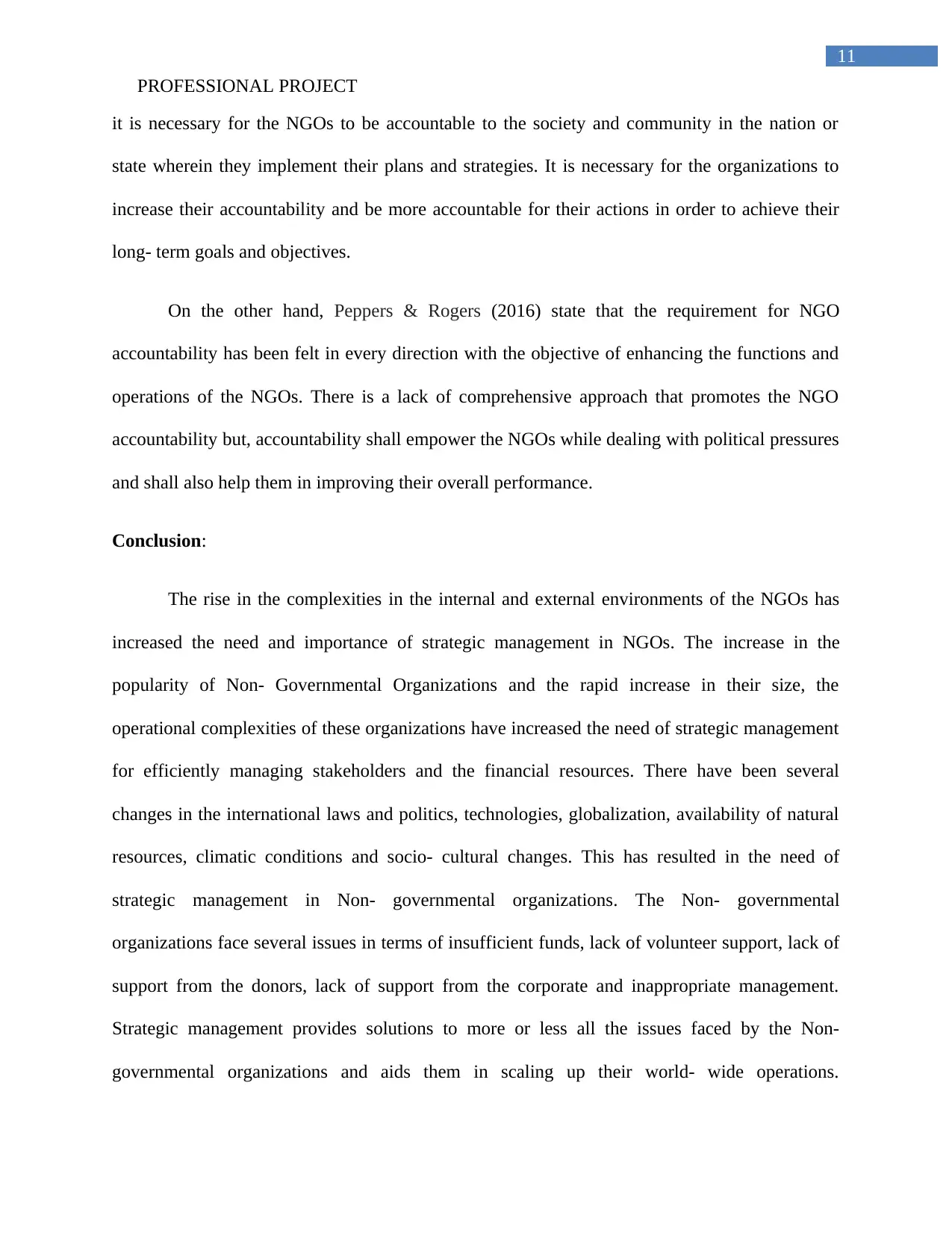
11
PROFESSIONAL PROJECT
it is necessary for the NGOs to be accountable to the society and community in the nation or
state wherein they implement their plans and strategies. It is necessary for the organizations to
increase their accountability and be more accountable for their actions in order to achieve their
long- term goals and objectives.
On the other hand, Peppers & Rogers (2016) state that the requirement for NGO
accountability has been felt in every direction with the objective of enhancing the functions and
operations of the NGOs. There is a lack of comprehensive approach that promotes the NGO
accountability but, accountability shall empower the NGOs while dealing with political pressures
and shall also help them in improving their overall performance.
Conclusion:
The rise in the complexities in the internal and external environments of the NGOs has
increased the need and importance of strategic management in NGOs. The increase in the
popularity of Non- Governmental Organizations and the rapid increase in their size, the
operational complexities of these organizations have increased the need of strategic management
for efficiently managing stakeholders and the financial resources. There have been several
changes in the international laws and politics, technologies, globalization, availability of natural
resources, climatic conditions and socio- cultural changes. This has resulted in the need of
strategic management in Non- governmental organizations. The Non- governmental
organizations face several issues in terms of insufficient funds, lack of volunteer support, lack of
support from the donors, lack of support from the corporate and inappropriate management.
Strategic management provides solutions to more or less all the issues faced by the Non-
governmental organizations and aids them in scaling up their world- wide operations.
PROFESSIONAL PROJECT
it is necessary for the NGOs to be accountable to the society and community in the nation or
state wherein they implement their plans and strategies. It is necessary for the organizations to
increase their accountability and be more accountable for their actions in order to achieve their
long- term goals and objectives.
On the other hand, Peppers & Rogers (2016) state that the requirement for NGO
accountability has been felt in every direction with the objective of enhancing the functions and
operations of the NGOs. There is a lack of comprehensive approach that promotes the NGO
accountability but, accountability shall empower the NGOs while dealing with political pressures
and shall also help them in improving their overall performance.
Conclusion:
The rise in the complexities in the internal and external environments of the NGOs has
increased the need and importance of strategic management in NGOs. The increase in the
popularity of Non- Governmental Organizations and the rapid increase in their size, the
operational complexities of these organizations have increased the need of strategic management
for efficiently managing stakeholders and the financial resources. There have been several
changes in the international laws and politics, technologies, globalization, availability of natural
resources, climatic conditions and socio- cultural changes. This has resulted in the need of
strategic management in Non- governmental organizations. The Non- governmental
organizations face several issues in terms of insufficient funds, lack of volunteer support, lack of
support from the donors, lack of support from the corporate and inappropriate management.
Strategic management provides solutions to more or less all the issues faced by the Non-
governmental organizations and aids them in scaling up their world- wide operations.
⊘ This is a preview!⊘
Do you want full access?
Subscribe today to unlock all pages.

Trusted by 1+ million students worldwide
1 out of 15
Related Documents
Your All-in-One AI-Powered Toolkit for Academic Success.
+13062052269
info@desklib.com
Available 24*7 on WhatsApp / Email
![[object Object]](/_next/static/media/star-bottom.7253800d.svg)
Unlock your academic potential
Copyright © 2020–2025 A2Z Services. All Rights Reserved. Developed and managed by ZUCOL.





